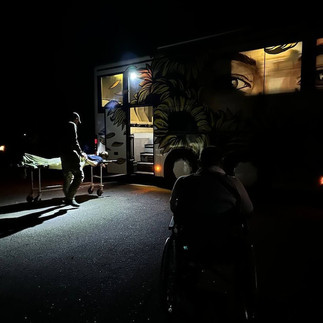Elena Gerasimyuk is a Ukrainian writer and a veteran of the "Hospitallers." She oversees the work of the "Avstriyka" evacuation bus, which transports wounded.
First aid is provided where the injury occurred. The main goal is to stop the bleeding and get the person to a safer area. Medics and rescuers work on casevacs.
The second line involves evacuation on medevac vehicles - ambulances waiting a few kilometers away. Here, more extensive medical assistance is available. The third line consists of stabilization points. Here, the wounded receive initial surgical care. Doctors stabilize the condition of the wounded so that they can be safely transported to major hospitals without complications. After the stabilization points, the "Avstriyka" crew goes into action. Their task is to monitor the condition of the wounded and unload the wards at the nearest hospitals, evacuating the wounded to other cities. This prevents a collapse of the medical system.

Roles in the "Avstriyka" crew are clearly defined. The most crucial role belongs to the drivers. This is not an ordinary bus, but a complex medical ward on wheels that requires proper maintenance and care. Everything in the cabin must work perfectly because people's health depends on it. An anesthesiologist, surgeon, or traumatologist must always be part of the crew. The most critical decisions are made by them. The medical staff accompanies the wounded from the moment of examination at the stabilization point to the operating table in the hospital. The nursing team takes care of the wounded, controls their personal belongings, and much more. Cleaning and inventory are handled by the "Hospitallers" independently, regardless of their status. On the night of October 1st, the "Avstriyka" crew evacuated its 2011th wounded. The man in the photo suffered burns covering 45% of his body: head, arms, back, and abdomen. His condition is severe and requires special attention. They transport the wounded from one intensive care unit to another without additional delay.

Burns are an extremely complex trauma. Skin integrity violations have instant consequences. It's an incredible stress for the body. In addition to severe pain at the injury site, it becomes a target for harmful substances and microbes. The body also has a harder time retaining heat and water. So, throughout the journey, the medics kept the wounded warm with blankets and special thermal blankets. They periodically provided oxygen, as burns meant the person was in a fire and inhaled combustion products. The "Avstriyka" is an example of attention and care for the wounded. Moral support is just as important as medical care. If the wounded are hungry and there are no contraindications, they are offered light snacks and even coffee. Sometimes they have to communicate with the families and inform them about the injuries. When saying goodbye, we wish each wounded person a speedy recovery and thank them for their courage. After the evacuation, the entire team cleans the interior of the medical bus, disposes of biological waste in special places, sanitizes the ward, cleans the air, and takes inventory. On average, flights last 9-10 hours, usually at night. Therefore, during the day, the crew takes a break. Support the hard work of our volunteer paramedics and donate generously! #Hospitallers #Paramedics #UkraineParamedics #HospitallersUkraine #HospitallersUK #HelpHospitallers #Ukraine #SupportUkraine #HelpUkraine #StandWithUkraine #HelpUkraineNow







Comments